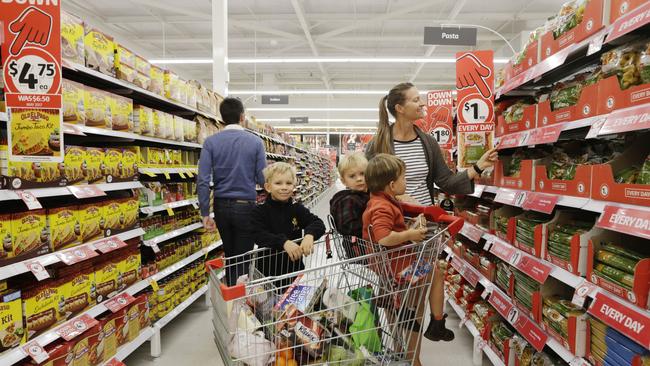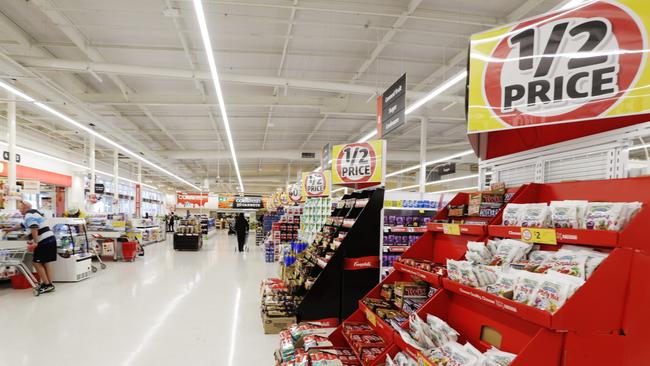Coles could lose $10bn in value under current strategy, warns BAML’s David Errington
Coles’ focus on lower prices isn’t working and the strategy could badly dent Wesfarmers’ balance sheet, says a key analyst.

Coles is at a crossroads and could wipe more than $10 billion in value from Wesfarmers’ balance sheet unless it can land on a new strategy to arrest its decline in the face of a resurgent Woolworths, a new report from outspoken retail analyst David Errington has warned.
The new Bank of America Merrill Lynch report says Coles is currently valued on the Wesfarmers’ books at $25 billion, but that it might be headed to $15 billion as its once-successful focus on lower prices is no longer working.
It’s the latest report to take a bearish view of Coles amid intense competition in the $90 billion grocery sector.
Under CEO Brad Banducci, Woolworths has transformed its once-struggling supermarket business to outperform smaller rival Coles since the second quarter of 2016-17 in terms of same-store sales growth.
Many analysts have warned that Coles is now on the ropes and that its strategy to continue to lower prices will come at to shareholders, as it erodes earnings.
It came as a new UBS shopper survey found that Woolworths has continued to grow share, German discounter Aldi has re-accelerated and Coles has softened, both year-on-year and against results from February 2017.
However, UBS did say that while Coles softened, there were positives in the result, particularly around fresh penetration, suggesting an irrational response to a resurgent competitor is unlikely.
“On balance we believe the results suggest a more favourable view on the sector, suggesting no retailer is doing materially worse in the customers eyes, and there were positives for all. The above said, share of spend trends do suggest Woolworths has seen an acceleration in sales growth vs. Feb, Coles softened and Metcash is losing share,” said UBS analyst Ben Gilbert.
Earlier, BAML’s Mr Errington told clients that over the past six to 12 months, Coles’ performance haD deteriorated markedly following Woolworths’ turnaround.
“We are not concerned about the mean reversion as we had thought that Woolworths would recover and that Coles would lose some ground — Coles was probably overachieving due to Woolworths misfiring.
“But we are concerned (at an escalating rate) toward the strategies adopted by Coles, and we see value of Coles deteriorating at a fast pace. Although a $10 billion drop looks substantial, if the current strategies are sustained, we think this drop could be realistic.”
Coles “has not responded well to Woolworths’ resurgence’’, Mr Errington said.
Coles’ past success had been built on a price-focused strategy, which worked while its major competitor was distracted and performed poorly.
“However, Woolworths has rebased prices and earnings and we now consider a strategy centred on prices not optimal and value-destructive to not only Coles, but potentially the entire industry,” Mr Errington said.
“If Coles continues to lower prices (leading price deflation in the industry), we see sales growth remaining at low levels and cost growth exceeding sales growth.
“We can then foresee Coles’ free cash flow falling substantially, potentially to below $1 billion — supporting a valuation for Coles of $15 billion.
“A $10 billion differential would translate to $9 per Wesfarmers share, highlighting the importance of the issue.
“Although point-in-time valuations need to be considered in context, and that they can change rapidly if conditions or strategies change, the point we make is that the current direction that Coles looks headed (focusing on sustained lowering of prices and price deflation) causes us to believe that a more bearish outlook (and valuation) of Coles is becoming more appropriate.”
Mr Errington said a case in point in his concern about Coles lowering prices was its decision only a few weeks ago to reduce the prices of bread significantly — only to see Woolworths match its prices immediately.
“(This) was substandard retailing strategy in our view,” he said. “We suspect the bread reduction cost Coles (and Woolworths) around $30 million each — depending on supplier support — although there is not much bread suppliers can give to retailers given their very low margins.”
In June, Coles boss John Durkan pledged to investors that Coles would maintain the competitive pressure on Woolworths by pouring nearly another $200 million into lowering shelf prices further. This followed more than $1 billion spent by Woolworths on lower prices and improving the in-store experience for shoppers.

But all this price-cutting will hurt company earnings, and ultimately shareholders, says Mr Errington.
“Our view is that a sustained price deflation strategy will continue to see sales growth fall, earnings fall, and cash generation fall,” Mr Errington said.
He was also critical of Mr Durkan’s mantra that many shoppers only have a $150 weekly food budget.
“However we believe this may target less than 40 per cent of all shoppers. Focusing on 40 per cent of shoppers (in a space where discounters operate with credibility) does not look to us to be an optimal strategy — and we think may damage perceptions toward the quality of products in Coles (particularly in fresh produce) — as Coles strives to be seen as cheap.”
Last week Mr Durkan said many shoppers were feeling the strains of rising living expenses and stagnating wages, and were forced to give up on fresh food and meat to select cheaper, sometimes less healthy, food options.




To join the conversation, please log in. Don't have an account? Register
Join the conversation, you are commenting as Logout